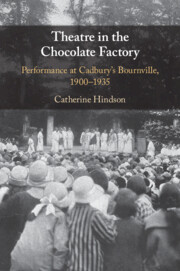Refine search
Actions for selected content:
2 results
Introduction
-
- Book:
- Theatre in the Chocolate Factory
- Published online:
- 23 June 2023
- Print publication:
- 13 July 2023, pp 1-18
-
- Chapter
-
- You have access
- HTML
- Export citation

Theatre in the Chocolate Factory
- Performance at Cadbury's Bournville, 1900–1935
-
- Published online:
- 23 June 2023
- Print publication:
- 13 July 2023
